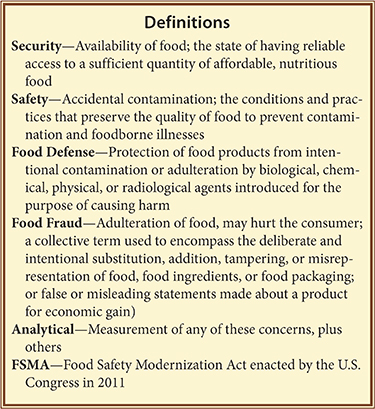 The U.S. Food Safety and Modernization Act (FSMA) is having a ripple effect around the world due to the interconnections in the global food supply (GFS). This sweeping, bipartisan legislation was triggered by widely reported outbreaks of foodborne illness. Signed into law in 2011, it has been rolling out in phases since 2015. In 2019, the scope of companies required to comply will expand and raise the bar on food safety and food defense enforcement globally.
The U.S. Food Safety and Modernization Act (FSMA) is having a ripple effect around the world due to the interconnections in the global food supply (GFS). This sweeping, bipartisan legislation was triggered by widely reported outbreaks of foodborne illness. Signed into law in 2011, it has been rolling out in phases since 2015. In 2019, the scope of companies required to comply will expand and raise the bar on food safety and food defense enforcement globally.
Global food safety standards and practices that have historically guided companies involved in food imports and exports are not in compliance with FSMA regulations due to the new concepts on which FSMA is based, as well the required “regulatory status” compliance it entails. It is not only U.S. companies that must comply with these new regulations. Any foreign company that sells, manufactures, produces, packs, holds, or distributes food to the United States, or that is in some way related to the food supply chain, including ingredients and food contact substances, must adhere to a number of strict, new standards. Many foreign and smaller companies are not prepared for the challenges introduced by FSMA.
 This issue of Cereal Foods World (CFW) continues the Global Food System super theme that was introduced in the January-February issue, with a deep dive into global food safety and food defense. FSMA and its impact on the entire GFS is at the center of this issue.
This issue of Cereal Foods World (CFW) continues the Global Food System super theme that was introduced in the January-February issue, with a deep dive into global food safety and food defense. FSMA and its impact on the entire GFS is at the center of this issue.
We are fortunate to have one of the world’s top experts on FSMA, Kathy Gombas with the Food Safety Preventive Controls Alliance (the training arm of FSMA), contribute to this issue. Her article serves as a primer on FSMA. She describes how FSMA is disrupting food safety practices globally as she covers three key principles that the other articles also address: reasonable foreseeable hazards, scientific validations for preventive controls, and the foreign supplier verification program. Companies must put in place evidence-based controls and assign a trained expert, called a preventive controls quality individual (PCQI), to conduct hazard analyses and prepare the company’s food safety manual.
Neil Buck from General Mills sheds light on the impact of FSMA on multinational food companies operating within the European Union. He addresses how food safety and security are not insular activities, but are intricately entwined with product development, processes and production, and consumer needs and demands.
Two scientists from the Grocery Manufacturers of America (GMA), Akhila Vasan and Brian Bedard, discuss how the 21st century GFS is resilient in responding to consumer demands. If a desired food or ingredient is unavailable in one location, it can be sourced from another part of the world.
Daryl Ritchison offers an in-depth perspective on the impact of climate conditions on food security from the viewpoint of a meteorologist at North Dakota State University. He cites evidence showing how climate conditions affect crops and the quality of food products. He also discusses how predictive tools can be used to plan for future climate conditions and improve crop yields.
Scientists from Girish Ganjyal’s lab at Washington State University delve into the roles and responsibilities of the PCQI that are spelled out in FSMA regulations. These individuals are required to identify all hazards that are “known and reasonably foreseeable to occur” and develop a scientific, evidence-based food safety plan explaining how these hazards would be controlled.
In her article, Kaiping Deng from the Illinois Institute for Food Safety helps shed light on why transportation of fresh produce, including sprouts, continues to be a food safety challenge.
This issue also includes spotlight interviews with the Food Safety Preventive Controls Alliance and active AACCI volunteer and CFW author Girish Ganjyal.
Food safety and food defense are interconnected across the entire food production system, from the farm through the value chain to the consumer’s experience. Today the world faces serious food safety challenges on many fronts, from simple contamination to the threat of a virus transfer through ingredients and finished products in the livestock industry (e.g., African swine fever virus has crossed borders and traveled thousands of kilometers, most likely using water and feed as the transmission vector). Global food trade has created a situation where regulations like FSMA follow the movement of foods across borders. We must stay “on guard” and home-in on the preventive nature of FSMA.
